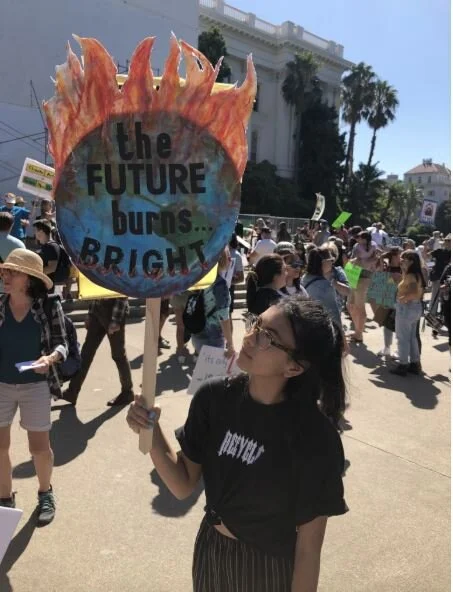All-electric construction among final recommendations of Mayors’ climate commission
A “living wall” in the sustainable office building that houses the Arch Nexus architecture firm in midtown
The Mayors’ Commission on Climate change unanimously approved its final report on Monday, June 29 with strategies for Sacramento and West Sacramento to achieve net zero greenhouse gas emissions, referred to as carbon zero, by 2045.
Mayors Darrell Steinberg and Christopher Cabaldon of West Sacramento, who jointly created the Commission, attended the final meeting and acknowledged the Commission’s work and the commitments made to begin implementation of the recommendations.
The recommendations focus on activities in the largest carbon-emitting sectors — the built environment and transportation. Denser land use, electrification of buildings and vehicles and significantly more trips via bike, walking, transit and shared mobility are key strategies. The actions also focus on public health through expanding green space and tree canopies in all neighborhoods, enhancing food security through sourcing locally and reducing food waste and building networks to increase community adaptation to climate change extremes.
Hundreds of people attended the commission meetings over the course of the last year, and hundreds submitted letters and emails in the two weeks leading up to the final meeting.
“This issue has captivated residents in Sacramento and West Sacramento,” said Mayor Steinberg. “This is not just an environmental crisis but a public health crisis, and your recommendations address it this way.”
Electric vehicle chargers at Sacramento International Airport
‘Urgent and profound’
Mayor Cabaldon said the “crisis is even more urgent and profound that when the work started.” He told the Commissioners and 188 virtual participants in Monday’s meeting that “we need to all be ready to work, lead, control, change, outreach and engage. And he noted that we “all need to employ the lens of equity and that the next generation will lead us in this imperative.”
Both mayors and the Commission acknowledged the hundreds of letters and emails from the community in the two weeks prior to the Commission meeting.
The ninth and final Commission meeting followed 18 months of public meetings as the Commission sought input on strategies through five Technical Advisory Committees, a university climate summit, a high school climate summit and an online public comment portal. The 19-member Commission was chaired by Anne Stausboll, former CEO of the California Public Employees Retirement System, and staffed by the non-profit Local Government Commission.
The Commission adopted nine overarching strategies in three key sectors: the built environment, mobility, and community health and resilience. The strategies will be forwarded to the cities for inclusion in their Climate Action Plans and in Sacramento’s 2040 General Plan Update.
The Commission and the Equity Technical Advisory Committee also spent considerable time to identify equity recommendations as the overarching lens through which all future investment programs and projects will be advised. One of the first actions for the City of Sacramento Mayor’s Office will be to support the creation of a community-led Environmental Justice Collaborative Governance Board to support marginalized communities, particularly communities of color and youth, in prioritizing investment and environmental solutions.
All-electric Gig rideshare car
All-electric by 2026
The draft report had included a recommendation to mandate all-electric construction to eliminate fossil-fuel use in new buildings by 2023. The strategy was modified following discussion of issues raised by the Sacramento Metro Chamber, the Building Industry Association, several property management associations, and the propane industry. The business groups cited the impacts from the COVID-19, financial and housing crises, and technical issues with infrastructure and capacity in downtown Sacramento. Arlen Orchard, the General Manager of the Sacramento Municipal Utility District presented technical information to inform the discussion, and developer Nikky Mohanna, described her experiences with developing high-rise projects in downtown Sacramento. The strategy was modified to phase the electrification of new construction based on type of development with low-rise mandated by 2023 and other development by 2026.
First meeting of the Mayors’ Commission on Climate Change
West Sacramento Councilmember and Commissioner Chris Ledesma also introduced language to amend the foundational principles specific to advocacy as the city looks to electrify its built environment. The addition asked that the Commission support the transition of West Sacramento from Pacific Gas & Electric to a more climate-supportive utility service that would enable the city to implement the full suite of proposed strategies.
More information on the Mayors’ Climate Commission is available here including the commitments made by the Commissioners for early action to address climate change. For more information on the City’s 2040 General Plan Update click here.







